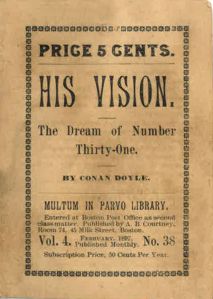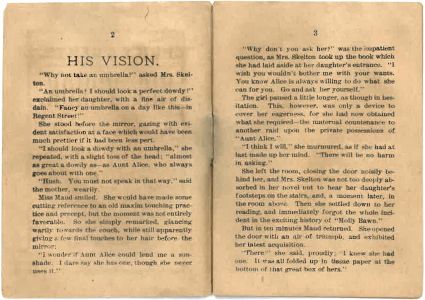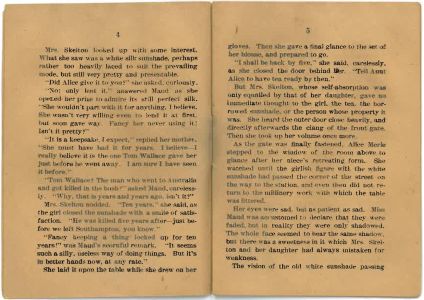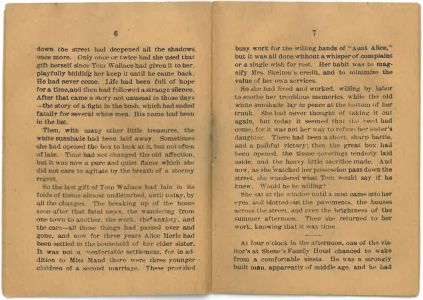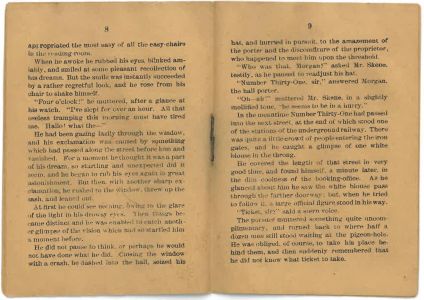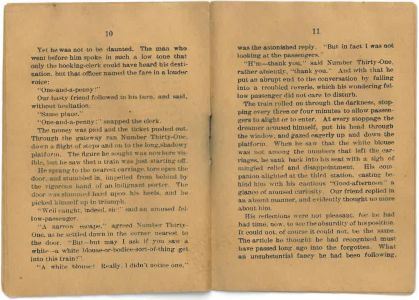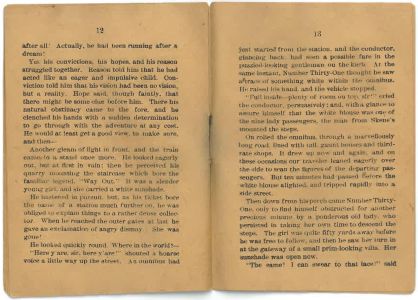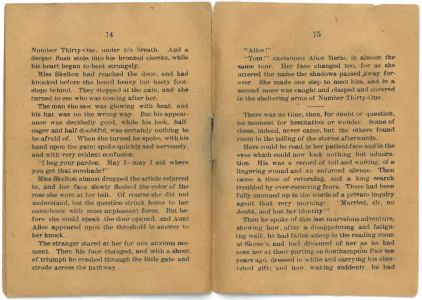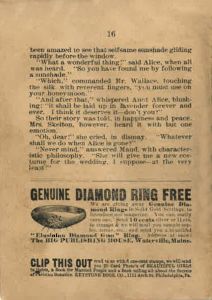The Dream of Number Thirty-One
The Dream of Number Thirty-One is a short story written by W. E. Cule published in the Chambers's Journal on 2 january 1897.
A month later, in february 1897, American publisher A. B. Courtney published the text as His Vision. The Dream of Number Thirty-One, by Conan Doyle (instead W. E. Cule).
Editions
- in Chambers's Journal (2 january 1897 [UK])
- His Vision. The Dream of Number Thirty-One (1897, A. B. Courtney) wrongly attributed to Conan Doyle
The Dream of Number Thirty-One



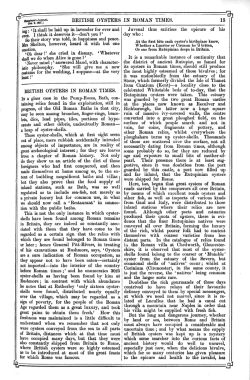
By W. E. Cule
'Why not take an umbrella?' asked Mrs Skelton.
'An umbrella? I should look a perfect dowdy!' exclaimed her daughter, with a fine air of disdain. 'Fancy an umbrella on a day like this — in Regent Street!'
She stood before the mirror, gazing with evident satisfaction at a face which would have been much prettier if it had been less pert.
'I should look a dowdy with an umbrella,' she repeated, with a slight toss of the head; 'almost as great a dowdy as — as Aunt Alice, who always goes about with one.'
'Hush. You must not speak in that way,' said the soother wearily.
Miss Maud smiled. She would have made some cutting reference to ass old maxim touching practice and precept, but the moment was not entirely favourable. So she simply remarked, glancing warily towards the couch, while still apparently giving a few final touches to her hair before the mirror—
'I wonder if Aunt Alice could lend me a sunshade. I daresay she has one, though she never uses it.'
'Why don't you ask her?' was the impatient question, as Mrs Skelton took up the book which else had laid aside at her daughter's entrance. wish you wouldn't bother me with your wants. You know Alice is always willing to do what she can for you. Go and ask her yourself.'
The girl paused a little longer, as though in hesitation. This, however, was only a device to cover her eagerness, for she had now obtained what she required — the maternal countenance to another raid upon the private possessions of 'Aunt Alice.'
'I think I will,' she murmured, as if she had at last made up her mind. 'There will be no harm in asking.'
She left the room, closing the door noisily behind her, and Mrs Skelton was not too deeply absorbed in her novel not to hear her daughter's footsteps on the stairs, and, a moment later, in the room above. Then she settled down to her reading, and immediately forgot the whole incident in the exciting history of 'Molly Bawn.'
But in ten minutes Maud returned. She opened the door with an air of triumph and exhibited her latest acquisition.
'There!' she said proudly; I knew she had one. It was all folded up in tissue paper at the bottom of that great box of hers.'
Mrs Skelton looked up with some interest. What she saw was a white silk sunshade, perhaps rather too heavily laced to suit the prevailing mode, but still very pretty and presentable.
'Did Alice give it to you?' she asked curiously.
'No; only lent it,' answered Maud as she opened her prize to admire its still perfect silk. 'She wouldn't part with it for anything, I believe. She wasn't very willing even to lend it at first, but soon gave way. Fancy her never using it! Isn't it pretty!
'It is a keepsake, I expect,' replied her mother. She must have had it for years. I believe — I really believe it is the one Tom Wallace gave her just before he went away. I am sure I have seen it before.'
'Tom Wallace? The man who went to Australia and got killed in the bush?' asked Maud carelessly. 'Why, that is years and years ago, isn't it?'
Mrs Skelton nodded. 'Ten years,' she said, as the girl closed the sunshade with a smile of satisfaction. 'He was killed five years after — just before we left Southampton, you know.'
'Fancy keeping a thing locked up for ten years!' was Maud's scornful remark. 'It seems such a silly useless way of doing things. But it's in better hands now, at any rate.'
She laid it upon the table while she drew on her gloves. Then she gave a final glance to the sit of her blouse, and prepared to go.
'I shall be back by five,' she said carelessly, as she closed the door behind her. 'Tell Aunt Alice to have tea ready by then.'
But Mrs Skelton, whose self-absorption was only equalled by that of her daughter, gave no immediate thought to the girl, the tea, the bor. rowed sunshade, or the person whose property it was She heard the outer door close heavily, and directly afterwards the clang of the front gate. Then she took up her volume once more.
As the gate was fluidly fastened, Alice Merle stepped to the window of the room above, to glance after her niece's retreating form. She watched until 'the figure with the white sunshade hail passed the corner of the street on the way to the station, and even then did not return to the millinery work with which the table was littered.
Her eyes were sad, but as patient as sad. Miss Maud was accustomed to declare that they were faded, but in reality they were only shadowed. The whole face seemed to bear the same shadow, but there was a sweetness in it which Mrs Skelton and her daughter had always mistaken for weakness.
The vision of the old white sunshade passing down the street had deepened all the shadows once more. Only once or twice bad she used that gift herself since Tons Wallace had given it to her, playfully bidding her keep it until he came back. He had never come. Life had been full of hope for a time, and then had followed a strange silence. After that came a story not unusual in those days — the story of a fight in the bush, which had ended fatally for several white men. His name had been in the list.
Then, with many other little treasures, the white sunshade bad been laid sway. Sometimes she had opened the box to look at it, but not often of late. Time had not changed the old affection, but it was now a pure and quiet flame which she did not care to agitate by the breath of a stormy regret.
So the last gift of Tons Wallace had lain in its folds of tissue almost undisturbed, until to-day, by all the changes. The breaking up of the home soon after that fatal news, the wandering from one town to another, the work, the anxiety, and the care — all those things bad passed over and gose, and now for three years Alice Merle had been settled in the household of her elder sister. It was not a comfortable settlement, for in addition to Miss Maud there were three younger children of a second marriage. These provided busy work for the willing hands of Aunt Alice,' but it was all done without a whisper of com-plaint or a single wish for rest. Her habit was to magnify Mrs Skelton's credit and to minimise the value of her own services.
So she had lived and worked, willing by labour to soothe her troublous memories, while the old white sunshade lay in peace at the bottom of her trunk. She had never thought of taking it out again, but to-day it seemed that the need bad come, for it was not her way to refuse her sister's daughter. There had been a short, sharp battle, and a painful victory ; then the great box had been opened, the tissue coverings tenderly laid aside, and the heavy little sacrifice made. And now, as she watched her possession pass down the street, she wondered what Tom would any if he knew. Would he be willing?
She sat at the window until a mist came into her eyes and blotted out the pavements, the bosses across the street, and even the brightness of the summer afternoon. Then she returned to her work, knowing that it was time.
At four o'clock in the afternoon, one of the visitors at Skene's Family Hotel chanced to wake from a comfortable siesta. He was a strongly-built man, apparently of middle age, and he had appropriated the most easy of all the easy chairs in the reading-room.
When he awoke he rubbed his eyes, blinked amiably, and smiled at some pleasant recollection of his dreams. But the smile was instantly succeeded by a rather regretful look, and he rose from his chair to shake himself.
'Four o'clock!' he muttered, after a glance at his watch. 'I've slept for over an hour. All that useless tramping this morning intuit have tired me. Hallo! what the'——
He had been gazing lazily through the window, and his exclamation was caused by something which had passed along the street before him and vanished. For a moment he thought it was a pert of his dream, no startling and unexpected did it seem, and be began to rub his eyes again in great astonishment.. But then, with another sharp exclamation, be rushed to the window, threw np the sash and leaned out.
At first he could see nothing, owing to the glare of the light in his drowsy eyes. Then things became distinct, and he was enabled to catch another glimpse of the vision which had as startled hint a moment before.
He did not pause to think, or perhaps he would not have done what he did. Closing the window with a crash, lie clashed into the hell, seized his hat, and hurried in pursuit, to the amazement of the porter and the discomfiture of the proprietor, who happened to meet hiss upon the threshold.
'Who was that, Morgan?' asked Mr Skene testily, as he paused to readjust his hat.
'Number Thirty-One, sir, answered Morgan, the hall-porter.
'Oh — ah!' muttered Mr Skene, in a slightly mollified tone, He seems to be in a hurry.'
In the meantime, Number Thirty-One had passed into the next street, at the end of which stood one of the stations of the underground railway. There was quite a little crowd of people entering the iron gates, and he caught a glimpse of one white blouse in the throng.
He covered the length of that street in very good time, and found himself, a minute later, in the dim coolness of the booking-office. As lie glanced about hint be saw the white blouse pass through the farther doorway; but, when he tried to follow it a large official figure stood in his way.
'Ticket, sir?' said a stern voice.
The pursuer muttered something quite uncomplimentary, and turned back to where half-a-dozen men still stood waiting at the pigeon-bole. He was obliged, of course, to take his place behind them, and then suddenly remembered that lie did not know what ticket to take.
Yet he was not to be daunted. The man who went before him spoke in such a low tone that only the booking-clerk could have heard his destination, but that officer named the fare in a louder voice:
'One-and-a-penny!'
Our hasty friend followed in his turn, and said without hesitation:
'Same place.'
'One-and-a-penny!' snapped the clerk.
The money was paid and the ticket pushed out. Through the gateway ran Number Thirty-One, down a flight of steps and on to the long, shadowy platform. The figure be sought was no-where visible, but he saw that a tram was just starting off.
He sprang to the nearest carriage, tore open the door, and stumbled in, impelled from behind by the vigorous hand of an indignant porter. The door was slammed bard upon his heels, and he picked himself up in triumph.
'Well caught, indeed, sir!' said an amused fellow-passenger.
'A narrow escape,' agreed Number Thirty-One, as he settled down ill the corner nearest to the door. 'But — but may I ask if you saw a white — a white blouse-or-bodice-sort-of-thing get into this train?'
'A white blouse? Really I didn't notice one,' was the astonished reply. 'But in fact I was not looking at the passengers.'
'H'm — thank you,' said Number Thirty-One, rather absently, 'thank you.' And with that he put an abrupt end to the conversation by falling into a troubled reverie, which his wondering fellow-passenger did not care to disturb.
The train rolled on through the darkness, stopping every three or four minutes to allow passengers to alight or to enter. At every stoppage, the dreamer roused himself, put his head through the window, and gazed eagerly up and down the platform. When he saw that the white blouse was not among the numbers that left the carriages, he sank back into his seat with a sigh of mingled relief and disappointment. His companion alighted at the third station, casting behind him with his cautious 'Good-afternoon' a glance of amused curiosity. Our friend replied in an absent manner, and evidently thought no inure about him.
His reflections were not pleasant, for he had had time, now, to see the absurdity of his position. It could not, of course it could not, be the same. The article he thought he had recognised insist have passed long ago into the forgotten. What an unsubstantial fancy he had been following, after all! Actually, he had been running after a dream!
Yet his convictions, his hopes, and his reason struggled together. Reason told him that lie had acted like ass eager and impulsive child. Conviction told him that his vision had been no vision, but a reality. Hope said, though faintly, that there might be some clue before hint. There his natural obstinacy came to the fore, and he clenched his bawls with a sudden determination to go through with the adventure at any cost. He would at least get a good view, to make sure, and then——
Another gleam of light in front, and the train cause to a stand once more. He looked eagerly out, but at first in vain : then he perceived his quarry mounting the staircase which bore the familiar legend, 'Way Out.' It was a slender young girl, and she carried a white sunshade.
He hastened in pursuit, but, as his ticket bore the name of a station much farther on, lie was obliged to explain things to a rather dense col-lector. When he reached the outer gates at last he gave an exclamation of angry dismay. She was gone!
He looked quickly round. Where in the world?——
'Here y'are, sir, here y'are!' shouted a hoarse voice a little way up the street. An omnibus had just started from the station, and the conductor, glancing back, had seers a possible fare in the puzzled-looking gentleman on the kerb. At the same instant, Is umber Thirty-One thought he saw a trace of something white within the omnibus. He raised his hand, and the vehicle stopped.
'Full inside — plenty of room on top, sir!' cried the conductor persuasively and, with a glance to assure himself that the white blouse was one of the nine lady passengers, the man from Skene's mounted the steps.
On rolled the omnibus, through a marvellously long road, lined with tall, gaunt houses and third-rate shops. It drew up now and again, and on these occasions our traveller leaned eagerly over the side to scan the figures of the departing passengers. But ten minutes had passed before the white blouse alighted, and tripped rapidly into a side street.
Then down from his perch came Number Thirty-One, only to find himself obstructed for another precious minute by a ponderous old lady, who persisted in taking her own time to descend the steps. The girl was quite fifty yards away before he was free to follow, and then he saw her turn in at the gateway of a small, prim-looking villa. Her sunshade was open now.
'The same! I can swear to that lace!' said Number Thirty-One, under his breath. And a deeper flush stole into his bronzed cheeks, while his heart began to beat strangely.
Miss Skelton had reached the door, and had knocked before she heard heavy but hasty foot. steps behind. They stopped at the gate, and she turned to see who was misting after her.
The man she saw was glowing with heat, and his hat was on the wrong way. But his appearance was decidedly good, while Isis look, tali. eager and half-doubtful, was certainly nothing to be afraid of. When she turned he spoke, with his hand upon the gate ; spoke quickly and nervously, and with very evident confusion:
'I beg your pardon. May I — may I ask where you got that sunshade?'
Miss Skelton almost dropped the article referred to, and her face slowly flushed the colour of the rose she wore at her belt. Of course she did not understand, but the question struck home to her conscience with most unpleasant force. But before die could speak the door opened, and Aunt Alice appeared upon the threshold in answer to her knock.
The stranger stared at her for one anxious moment. Then his face changed, and with a shout of triumph he crashed through the little gate and strode across the pathway.
'Alice!'
'Tom!' exclaimed Alice Merle, in almost the same tone. Her face changed too, for as she uttered the name the shadows passed away for ever. She made one step to meet him, and a second snore was caught and clasped and covered in the sheltering arms of Number Thirty-One.
There was no time, then, for doubt or question, no moment for hesitation or wonder. Some of these, indeed, never came, but the others found room in the telling of the stories afterwards.
Hers could be read in her patient face and in the eyes which could now look nothing but admiration. His was a record of toil and waiting, of a lingering wound and an enforced silence. Then cause a time of returning, and a long search troubled by ever-recurring fears. These had been fully summed up in the words of a private inquiry agent that very morning : 'Married, sir, no doubt, and lost her identity!'
Then be spoke of this last marvellous adventure, showing how, after a disappointing and fatiguing walk, he had fallen asleep in the reading-room at Skene's, and had dreamed of her as he had seen her at their parting on Southampton Pier ten years ago, dressed in white and carrying his cherished gift and how, waking suddenly, he had been amazed to see that self-same sunshade gliding rapidly before the window.
'What a wonderful thing!' said Alice, when all was heard. 'So you have found use by following a sunshade.'
'Which,' commanded Mr Wallace, touching the silk with reverent fingers, you must use on your honeymoon.'
'And after that,' whispered Aunt Alice, blushing: 'It shall be laid up in lavender for ever and ever. I think it deserves it — don't you?'
So their story was told, in happiness and peace. Mrs Skelton, however, heard it with but one emotion.
'Oh dear!' she cried in dismay. Whatever shall we do when Alice is gone?'
'Never mind;' answered Maud, with characteristic philosophy. 'She will give me a new costume for the wedding, I suppose — at the very least!'
More sources
- Published by A. B. Courtney (february 1897) wrongly attributed to Conan Doyle
-
cover
-
p. 2-3
-
p. 4-5
-
p. 6-7
-
p. 8-9
-
p. 10-11
-
p. 12-13
-
p. 14-15
-
p. 16
